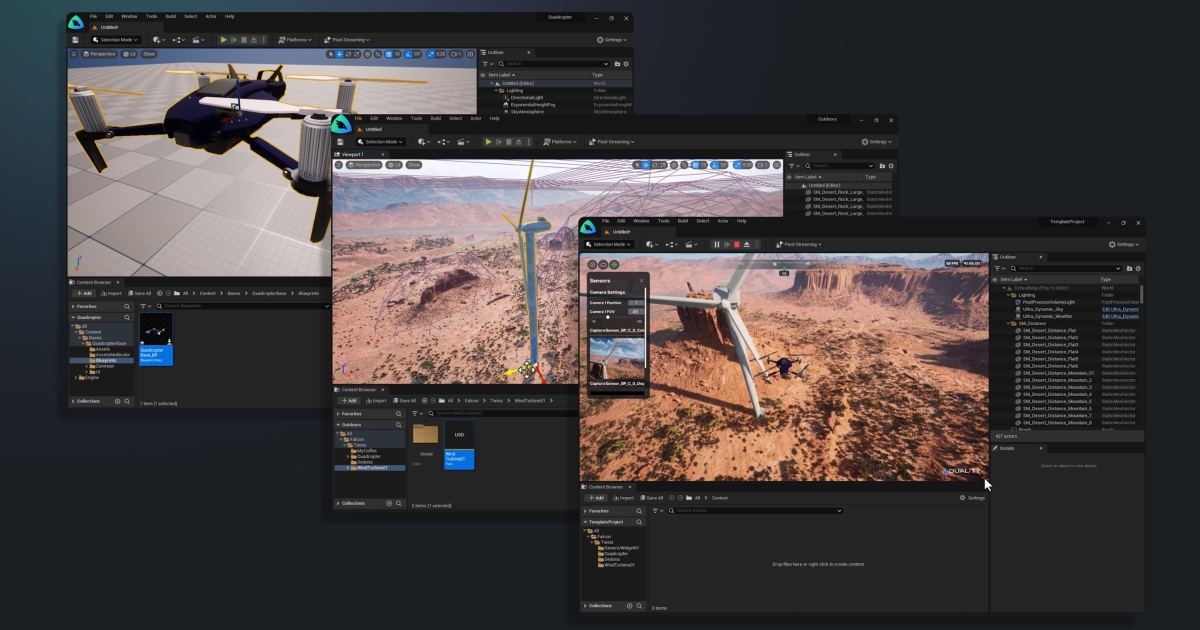
Let’s talk about Duality AI and digital twin technologies, for a moment.
Duality AI is laser-focused on creating virtual worlds that help solve real-world problems; i.e. digital twin simulations that provide insights which lead to smarter systems that are safer, more predictable, and bona fide resilient. Bear in mind, this is the software company behind Falcon, which provides high-fidelity, domain-tailored simulation to meet virtually (pun intended) any use case. And digital twins in general, as we know, are being seen more and more as powerful resources for understanding the physical world via AI models, robotics, smart system developments and so on.
However, not all simulation tools on the market today lend themselves to the unique requirements of what’s known as AI synthetic data creation. Being able to reliably simulate high-fidelity “synthetic” scenarios — allowing teams to validate and demo real-world workflows for being-tested/in-development products — is a win, whichever way you slice it. Producing digital twin-powered data in place of having to run costly in-person experiments in the field makes it easier for organizations to spotlight problems, cover edge cases, develop with fewer headaches, and ship products more expediently.
And that right there is the tie-in for Duality AI-related news we’re covering today:
Recently, Duality AI announced the general release of FalconEditor, a visual tool designed for creating digital twins and like simulations. On top of that, the gamer in me (I write by day, game by night; I’m a nerd, it’s a fact) is also jazzed up by the fact that FalconEditor was developed using Epic Games’ Unreal Engine, a real-time 3D tool used to create games and immersive experiences.
According to the official press release, this combo of Duality AI’s twins-to-data simulation workflow capabilities with the extension of Unreal Editor and open-source digital twin definition format “unlocks the entirety of the Unreal Engine ecosystem to enterprise customers without forcing them into adopting specific hardware or complicated, proprietary AI models.”
“From the outset, Duality based Falcon on Unreal Engine due to its unmatched rendering capabilities and immense content availability,” explained Apurva Shah, Duality AI’s CEO. “Bringing the functionality of Unreal Editor to Falcon was the clear next step to make simulation design that much easier and to better serve our customers' needs. We’re extremely proud of FalconEditor, and grateful to the team at Epic Games for supporting our vision of a digital twin future.”
This update positions Duality AI as a more-than-optimal simulation solutions provider for the Unreal Engine ecosystem. Additionally, the company’s FalconPro product license covers Unreal Editor access, as well as first-party support from Duality’s customer success team. By collaborating with Duality AI, Epic Games has shown their continued commitment to the adoption of Unreal Engine for enterprise applications.
“Duality is opening up brand-new ways to create high-quality digital twins by extending FalconEditor with Unreal Editor functionality,” added Bill Clifford, VP and GM for Unreal Engine and Creator Marketplaces at Epic Games. “Engineers and data scientists will be able to use these enhanced features to create massive virtual worlds using AI and robotic systems for digital twin simulation from anywhere, including directly from a web browser.”
The aforementioned press release (with further details on digital twin functionality, FalconEditor integrations and customizations available) can be found here.
Learn more about IoT news like this at IoT Evolution Expo 2025, which will be taking place from February 11-13, 2025, in Fort Lauderdale, Florida. Part of the #TECHSUPERSHOW experience, this event combines educational conference programming with a robust exhibit hall, networking events, and other activities, bringing together buyers and providers of business technology products and services that are critical to the Internet of Things.
Edited by
Greg Tavarez





